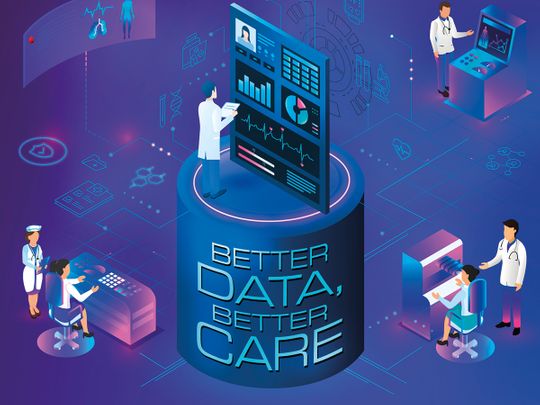All that the 80-year-old Emirati wanted was to get some relief from his high fever when he consulted Dr Maisa Abdalla, General Practitioner at Kanad Hospital. He had dismissed the doctor’s queries on chronic conditions he might suffer from with a cursory no. But it was imperative for Dr Abdalla to know the medical history of the patient she was seeing for the first time for prescribing medicine. Fortunately for her, Kanad Hospital was part of Abu Dhabi’s health information exchange (HIE) platform, Malaffi, that connects more than three quarters of the healthcare providers in the emirate. “I checked his file on Malaffi and saw that he had diabetes, hypertension and ischemic heart disease,” says Dr Abdalla. “Having these details in front of me was vital to help me treat his fever safely and quickly. Knowing about his comorbidities allowed me to plan the most appropriate, and safest treatment, and avoid any adverse drug reactions with other medication he was taking.”
This is just one example of how data sharing between hospitals improves healthcare.
“Throughout our lives, we will inevitably see multiple healthcare professionals at multiple facilities,” explains Atif Al Braiki, CEO of Abu Dhabi Health Data Services, which operates Malaffi, meaning my file in Arabic. “In the past, each facility would have had its own way of storing your important information. And this critical information wouldn’t have been available for other practitioners to see. Not only were vital pieces of information about your medical history or test results not available, these tests and procedures often had to be repeated every time you saw a new doctor.
In the past, each facility would have had its own way of storing your important information. And this critical information wouldn’t have been available for other practitioners to see.
“What HIEs like Malaffi do is provide instant access to this important information. Doctors have a complete picture of your health history. When the picture is complete, doctors can provide safer and more efficient care. This information can not only eliminate the need for repeat tests but it can be a critical part of the clinical decision-making process and can potentially be life-saving in emergency situations.”
Not surprisingly, the vital role health information exchanges play is not limited to patient care but also extends to managing crises such as a pandemic.
When Covid-19 hit, Abu Dhabi was in the midst of connecting healthcare facilities through Malaffi, having started in 2019. To exploit the advantage the HIE presents in tackling the pandemic, the Department of Health — Abu Dhabi (DoH) and Malaffi promptly came up with a two-prong strategy. All facilities that provided frontline care to Covid-19 patients were extended access to Malaffi, irrespective of whether they had signed up to the HIE or not, and a centralised, real-time database of every Covid-19 test result in the emirate was created.
“By centralising results from all testing sites in Abu Dhabi, through Malaffi, the DoH was able to access accurate and real-time key pandemic indicators,” explains Dr Hamed Ali Al Hashemi, Director of Strategy, DoH. “This meant that newly diagnosed cases could immediately be identified and traced. We had full visibility of the virus and its spread, as it happened. This enabled more efficient allocation of our vital resources, an important tool in containing the pandemic. We could better plan our testing response, support healthcare capacity planning and utilisation, and adjust the distribution of our response resources accordingly across the emirate. Overall, it facilitated better and safer care coordination for the people of Abu Dhabi.”
By centralising results from all testing sites in Abu Dhabi, through Malaffi, the DoH was able to access accurate and real-time key pandemic indicators.
For frontline health workers too it meant real-time test results and data that weren’t delayed by a manual process, paperwork or the fact that they didn’t have an onsite testing facility. Instead of five days, Malaffi was able to reduce the waiting time for results to under 48 hours, says Dr Rahul Goyal, Vice-President of Clinical Engagement and Adoption at Malaffi and Consultant Family Medicine. “It reduced delays in care — as soon as a positive result was seen, we could contact the patient immediately and ensure they took the necessary steps to prevent the spread of the virus. With access to a patient’s most important medical information [through Malaffi], we immediately knew about any underlying health conditions and healthcare professionals could triage patients quickly. For vulnerable patients, it meant we could get them the critical care they needed without delay.”
It reduced delays in care — as soon as a positive result was seen, we could contact the patient immediately and ensure they took the necessary steps to prevent the spread of the virus.
And it was all possible because of the standardisation of data. During the pandemic, DoH took immediate steps to mandate all testing laboratories in Abu Dhabi to capture a patient’s Emirates ID details and key demographic information for each sample they tested so that the record of the patient can be easily matched within Malaffi, explains Al Braiki. “When patient data is standardised, it increases the accuracy of data that is captured within an HIE. It allows the different healthcare industry systems to speak to each other, using the same language. And when we use a common language, we can consistently and coherently reshape the way critical healthcare data is collated, analysed and shared. This leads to a better standard of patient care and more reliable reporting to authorities.”
But we still have some way to go. Al Braiki says the DoH is working to further support the data standardisation and information exchange efforts in Abu Dhabi to ease the flow between different systems and create a stronger unified patient record and data source. “It is critical to facilitate better care, and the pandemic has demonstrated how the exchange of information through HIEs can support our patient community. But this change requires everyone to be on board, to collaborate for the greater good of our patients.”




